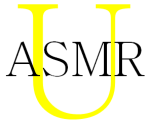 In 2016, Stephen Smith and Beverley Fredborg from the University of Winnipeg in Manitoba, Canada published a research paper about ASMR and brain activity (summary, interview, podcast episode).
In 2016, Stephen Smith and Beverley Fredborg from the University of Winnipeg in Manitoba, Canada published a research paper about ASMR and brain activity (summary, interview, podcast episode).
The dynamic duo has now done it again, publishing their second research paper about ASMR.
The paper is titled, “An Examination of Personality Traits Associated with Autonomous Sensory Meridian Response (ASMR)” and was published in the journal Frontiers in Psychology on February 23, 2017. The article was authored by Beverley Fredborg, Jim Clark, and Stephen Smith.
The goal of the study was to investigate if ASMR is associated with specific personality traits, and they also analyzed data about the perceived intensity of specific ASMR triggers.
The study had two groups; 290 individuals who experience ASMR and 290 individuals who do not experience ASMR.
Both groups completed a survey about personality traits and their results were compared for each of the following:
ASMR experiencers scored higher than Non-ASMR experiencers for:
- Openness-to-experience
- High score (tendencies): inventiveness, intellectual curiosity, prefer variety over routine, seek intense and euphoric experiences.
- Low score (tendencies): prefer consistency, exhibit caution, high perseverance, pragmatic, data-driven.
- Neuroticism
- High score (tendencies): emotionally reactive, vulnerable to stress, often feel threatened.
- Low score (tendencies): emotionally stable, less negative feelings.
ASMR experiencers scored lower than Non-ASMR experiencers for:
- Conscientiousness
- High score (tendencies): efficient, organized, self-disciplined, dependable.
- Low score (tendencies): easy-going, flexible, spontaneous, may be careless and/or unreliable at times.
- Extraversion
- High score (tendencies): outgoing, energetic, assertive, talkative, seek company, attention-seeking.
- Low score (tendencies): solitary, reserved, reflective, aloof, self-absorbed.
- Agreeableness
- High score (tendencies): friendly, compassionate, cooperative, trusting, helpful, well-tempered.
- Low score (tendencies): analytic, detached, competitive, argumentative.
The ASMR experiencing group also completed a survey about ASMR triggers.
The following stimuli are ranked from most intense to least intense for their perceived ability to stimulate ASMR-associated tingles:
- whispering
- haircut simulation
- tapping sounds
- scratching sounds
- watching someone touch another person’s hair
- watching someone draw
- watching someone paint
- watching others apply makeup and/or nail polish to another person
- watching someone touch their own hair
- watching others open a package
- watching others apply makeup and/or nail polish to themselves
- dentist simulation
- chewing sounds
- watching others cook
The paper provides additional data, deep analysis, and insightful discussion about additional aspects related to personality and ASMR triggers.
I strongly encourage you to click the link to their publication below to explore their findings in much more detail.
Click the links below to learn more about this publication:
- (Part 1: this article).
- Part 2: Interview with the authors.
- Podcast episode: Audio summary.
- Publication: Access their published research study.
Click the links below to learn more about ASMR research:
- Tips: How to be an ASMR researcher.
- Insight: Interviews with ASMR researchers.
- Browse: ASMR research and publications.
Want to be alerted of new blog articles, and/or new podcast episodes? Enter your email into the ***SAVE TIME*** widget (located in the sidebar or footer area).
Scroll down to Print, Share, Reblog, Like, Jump to related posts, or Comment.
This post brought to you by ASMR University. A site with the mission of increasing the awareness, understanding, and research of the Art and Science of Autonomous Sensory Meridian Response.
Pingback: Peer-reviewed research publications about Autonomous Sensory Meridian Response (ASMR) | ASMR University
Pingback: Interview with Bev Fredborg, author of the recent research publication about ASMR and personality traits. | ASMR University